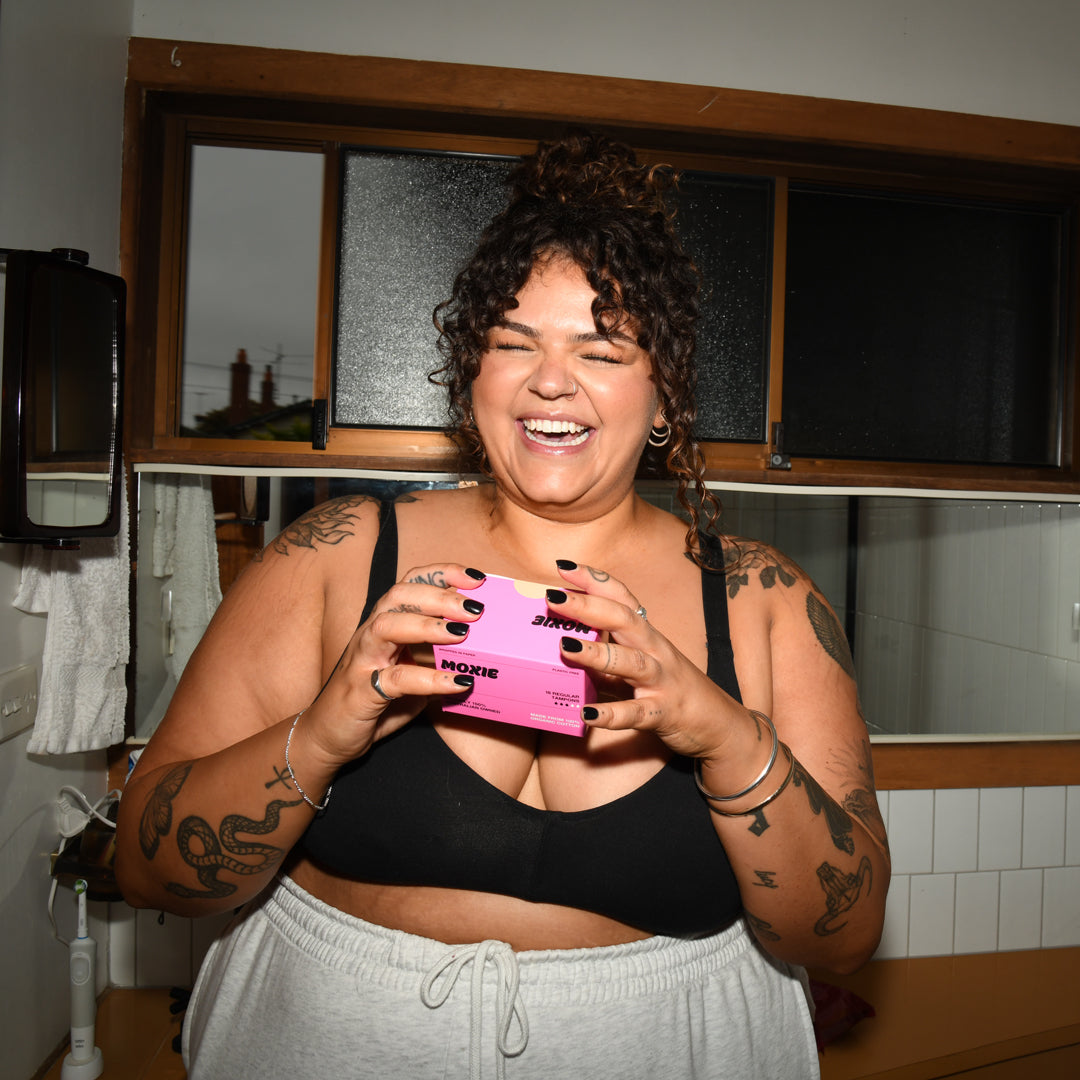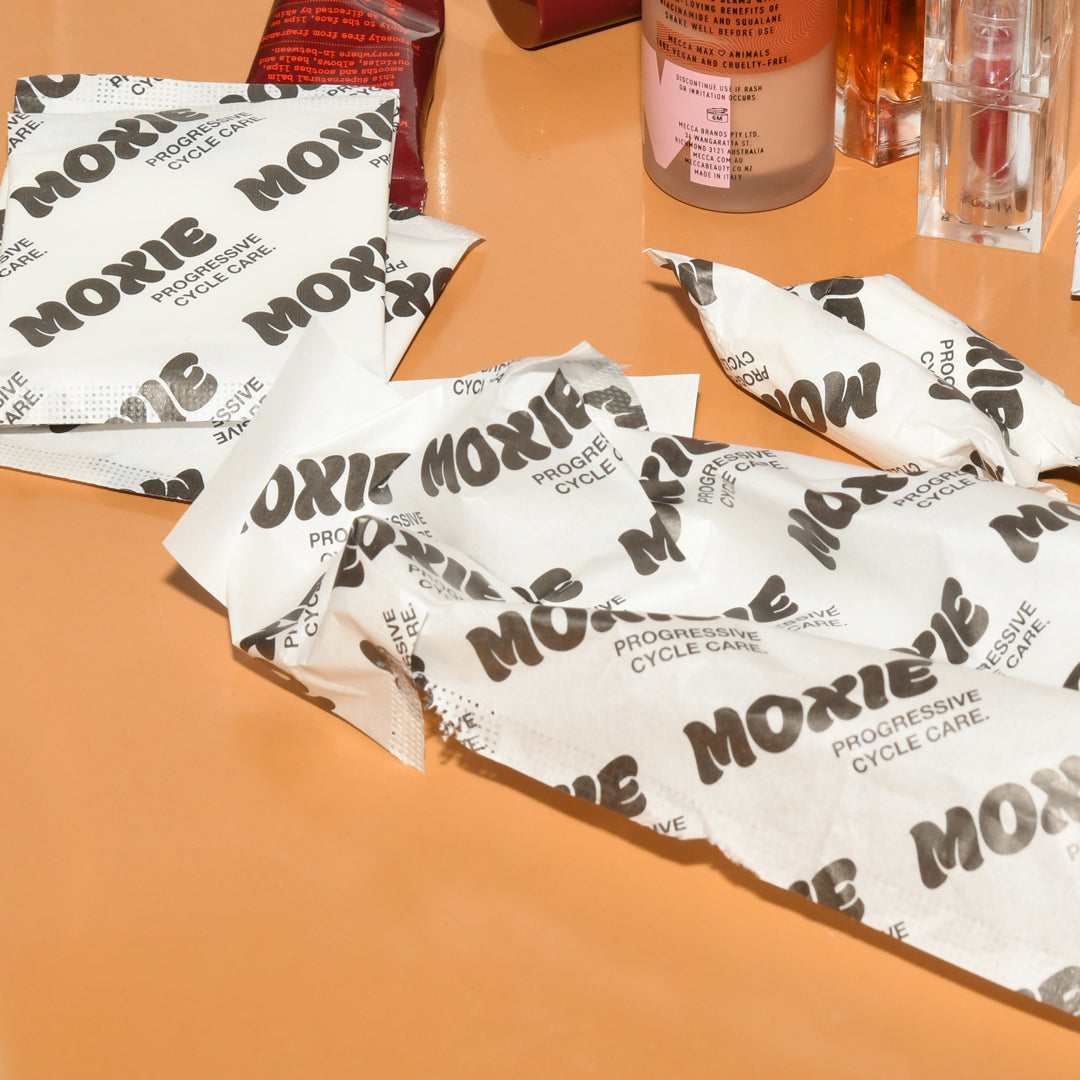"Can I swim whilst on my period?"

Remember those TV ads that showed women effortlessly frolicking on the beach in white dresses when they’ve got their period, insinuating that *insert brand here*’s products will make you feel confident enough to don your whitest whites and hit the beach during period week?
As unrealistic as these ads seemed (it was the OTT smiles and laughter mid-frolic, as if PMS doesn’t exist, that did it for us), there’s a hint of reality in the messaging: your period really shouldn’t stop you from doing any activity you want to – assuming you feel up to it, or aren’t in excruciating pain (shout out to our endo-warrior pals, as we know it can be a really tough time for some).
Here are some of your most common questions about periods and swimming, and the (real) facts you need to know before taking a dive.
IS IT SAFE/HYGIENIC TO SWIM WHILST ON YOUR PERIOD?
From a physiological perspective, there’s no reason why your period should prevent you from swimming*. There is nothing unhygienic about it, or unsafe (bar regular safety standards around water, of course) - it really comes down to personal preference.
Most public pools are chlorinated to kill bacteria and prevent the spread of diseases, so unless you've got unruly limbs or an out-of-control butterfly stroke, you’re unlikely to endanger anyone else by swimming whilst you’ve got your period.
CAN I GET AN INFECTION WHILST SWIMMING ON MY PERIOD?
You could get an infection from swimming, but this doesn’t really have anything to do with whether or not you have your period. Chlorinated pools in particular are more likely to cause irritation to the skin than salt-water, which may lead to a vaginal infection. The best way to reduce your risk of any infection down there is to shower as soon as you get out of the water and never stay in wet bathers for too long.
DOES YOUR PERIOD 'STOP' IN WATER?
To a degree, yes, it can/does. This is basically the result of physics and gravity (i.e. water pressure!), but you might still experience some leakage as you move around or swim, if you’re not wearing a period blocker - not to mention what might happen when you actually get out of the water and your flow/gravity resumes as normal.
IS IT TRUE THAT SWIMMING WHILST ON YOUR PERIOD CAN ATTRACT SHARKS?
This one’s a huge myth. We couldn’t find any evidence to suggest this is ACTUALLY a thing. You wouldn’t knowingly swim in shark-infested waters anyway, would you? But no, having your period doesn’t increase your chances of attracting them.
CAN SWIMMING MAKE PERIOD PAIN WORSE?
No worse than any other physical activity - actually, it can sometimes make it better. As told by our The Moxie Periodic Table resident fitness expert, Jacqui Kingswell, exercising whilst on your period can actually help soothe PMS-related period cramps as it releases endorphins = natural pain relievers!
WHAT PERIOD PRODUCTS ARE BEST FOR SWIMMING?
Anything that can be worn inside of the vagina to collect menstrual flow, like a tampon or a period cup, is going to be the most non-descript type of period care for swimming in that you or anyone else won't notice you're wearing it, or that you've even got your period; and, your less likely to experience leaks.
Also, you can leave a tampon or menstrual cup in for up to 8 hours at a time (you might need to change sooner, depending on your flow), which is handy if you're planning a long. lazy day by the pool or at the beach.
Pads aren't recommended for swimming because they're designed to be worn outside the body and will just end up becoming a wet, soppy, mess in your bathers when immersed in water.
ARE TAMPONS SAFE FOR SWIMMING?
Tampons are generally 'safe' to use during your period whilst swimming (or for any other activity), though they have been associated with Toxic Shock Syndrome (TSS). TSS is a very very rare but potentially life-threatening disease and whilst tampons do not contain the bacteria the causes TSS, it's important to know and understand the facts, and how you can help reduce your risk, prior to use. Learn more about TSS, HERE.
Note: all tampons, irrespective of what they're made from, carry the same risks associated with TSS (as do menstrual cups). Tampons and period cups should always be used in accordance with the instructions in pack - be sure to read these before use, and keep them handy for future reference.
WHAT ARE THE BEST TAMPONS FOR SWIMMING?
Ultimately, the best tampon to wear swimming is the one that best suits your flow, Moxette. For example, wear a regular tampon if you have a medium flow, a super tampon if you have a heavy flow. You should only ever wear the lowest possible tampon absorbency to suit your flow.
HOW DO YOU INSERT A TAMPON FOR SWIMMING?
The same way you would if you weren't swimming, Moxette. But if you're new to tampons, here's what to do: choose the tampon absorbency that best suits your flow (choose the lowest absorbency possible so as to help reduce your risk of Toxic Shock Syndrome), wash your hands, get in a comfy position and follow these easy how to instructions on how to insert a tampon.
Remember to change your tampon at least every 4 - 6 hours (depending on your flow) and never leave it in for more than 8 hours at a time).
CAN I SWIM WITHOUT A TAMPON OR CUP IF MY PERIOD IS LIGHT?
With all the above in mind, you might get away with not wearing anything at all whilst swimming if your period is suuuuuper light. It's unlikely that you're going to *gush* whilst in the water, especially if you're at the very end of your cycle, and darker bathers will help mask any accidental leaks, should they happen (PSA: there's no shame in a lil' leakage. It's happens! It's normal!).
If you're not willing to risk it, go with the lightest possible tampon absorbency you can for your flow (or, wear a period cup).
WHY DOES MY TAMPON LEAK WHEN I SWIM?
There are a few culprits of a leaky tampon. Here are the most common ones:
- You may not have inserted it correctly (don't sweat, Moxette - remove, open a freshie and try again. Handy 'how to' instructions, HERE).
- It may be inserted at an odd angle - try inserting a clean index finger and ensure it's sitting in the right spot (you can shift it around slightly if it's not). Otherwise, remove your tampon and re-insert a new one.
- You may not be using the right size for your flow (size up or size down accordingly, but remember to only use the lowest possible tampon absorbency to suit your flow).
If tamps aren't working for you whilst in the water, you might want to try a reusable menstrual cup, instead. They sit a little lower in the vagina than a tampon, and take up more surface area internally, so are pretty good at catching any flow trying to make its way out! Some people report they have less leaks with cups but again, much like tamps, it's important to insert and use them correctly.
*THE EXCEPTIONS TO THE RULE (WHEN IT'S BEST NOT TO SWIM WHILST ON YOUR PERIOD).
If you have an existing vaginal infection, have recently given birth, are bleeding after an egg collection or miscarriage, or have recently had any kind of procedure on your vulva/vagina, it’s best to consult your Doctor before taking a dip.
Otherwise, go with your own flow and feels; your body, your period, your choice.



